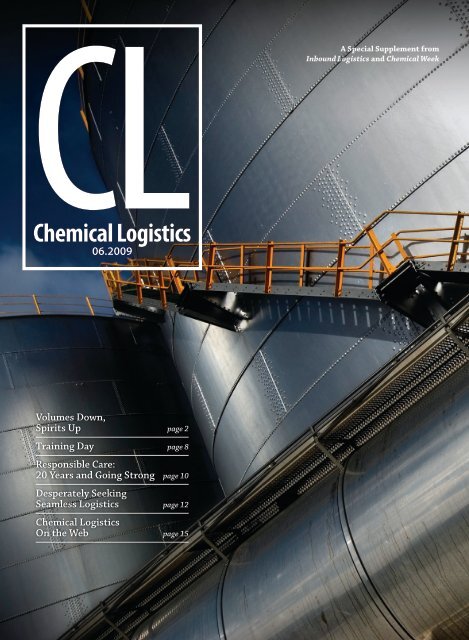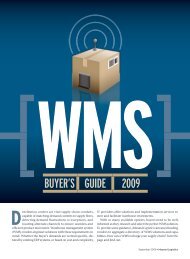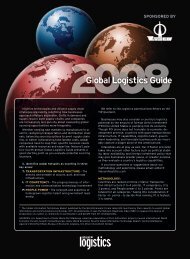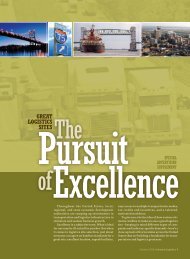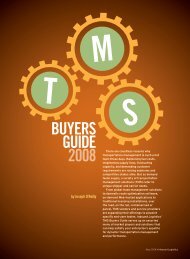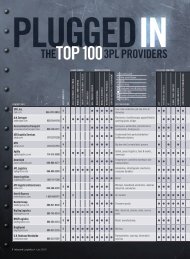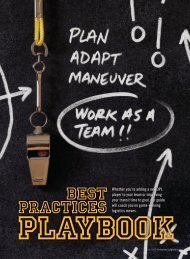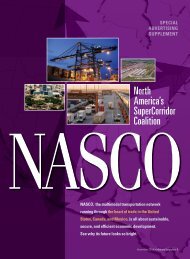Chemical Logistics - Inbound Logistics
Chemical Logistics - Inbound Logistics
Chemical Logistics - Inbound Logistics
Create successful ePaper yourself
Turn your PDF publications into a flip-book with our unique Google optimized e-Paper software.
CL<br />
<strong>Chemical</strong> <strong>Logistics</strong><br />
06.2009<br />
A Special Supplement from<br />
<strong>Inbound</strong> <strong>Logistics</strong> and <strong>Chemical</strong> Week<br />
Volumes Down,<br />
Spirits Up page 2<br />
Training Day page 8<br />
Responsible Care:<br />
20 Years and Going Strong page 10<br />
Desperately Seeking<br />
Seamless <strong>Logistics</strong> page 12<br />
<strong>Chemical</strong> <strong>Logistics</strong><br />
On the Web page 15
CL<br />
<strong>Chemical</strong> <strong>Logistics</strong><br />
A JOINT SUPPLEMENT FROM<br />
All articles written by Amy Roach Partridge<br />
Volumes Down, Spirits Up<br />
The chemical industry copes with an uncertain economic climate.<br />
While much of the news<br />
about the current recession<br />
has been focused on<br />
Wall Street, the housing<br />
market, and the automobile business,<br />
the chemical industry has not been<br />
spared. <strong>Chemical</strong> companies are also<br />
suffering – facing rising costs, lower<br />
profits, and the need to cut jobs and<br />
close plants.<br />
“The chemical industry’s decline<br />
was driven by the collapse of domestic<br />
demand, the disappearance of<br />
export markets – which experienced<br />
their worst decline since 1952 – and<br />
severe inventory de-stocking,” says<br />
Kevin Swift, senior economist for the<br />
American Chemistry Council (ACC).<br />
And it is not just American chemical<br />
companies that are in trouble; the<br />
industry is feeling the pinch around<br />
the globe. “The chemical industry<br />
downturn is global and synchronized,”<br />
Swift notes. “Nations that<br />
depend on manufactured goods<br />
exports have been affected the most.”<br />
<strong>Chemical</strong> shipment volumes are<br />
down significantly across the board,<br />
but because chemical manufacturers<br />
supply products to a large variety<br />
of vertical industries, some companies<br />
are faring better than others.<br />
“Volumes in the chemical industry<br />
have declined on average from five<br />
percent to 30 percent since last year,<br />
depending on the sector the company<br />
is serving. <strong>Chemical</strong> producers<br />
serving the auto industry, for example,<br />
are worse off than companies<br />
selling product to food manufacturers,”<br />
says Steve Hamilton, CEO of<br />
ChemLogix, a Blue Bell, Pa.-based<br />
third-party logistics provider (3PL)<br />
for the chemical industry.<br />
The fact that chemical producers<br />
are so well-diversified is one advantage<br />
during this recession. Profits<br />
from more successful units can make<br />
up for the loss of business in other<br />
units, helping companies weather the<br />
storm until the economy picks up.<br />
Philadelphia-based chemical producer<br />
Arkema, for example, credits<br />
a global mix of customers and business<br />
units for keeping its balance<br />
sheet fairly stable. One of its major<br />
products is plexiglass, which is used<br />
in tail light assembly for most vehicles<br />
produced in the United States.<br />
With demand for vehicles way down,<br />
demand for plexiglass has dropped<br />
off, too.<br />
Arkema’s plexiglass business – as<br />
well as other units that rest heavily<br />
on the auto and construction<br />
industries – is hurting. “But we have<br />
enough global exposure to other<br />
market segments that, across the<br />
board, we are doing well,” says Ron<br />
Looking at logistics: <strong>Chemical</strong> producer Arkema is coping with the recession by<br />
improving business processes wherever possible. <strong>Logistics</strong> heads the list.<br />
2 <strong>Inbound</strong> <strong>Logistics</strong> • June 2009
When it comes to dry bulk...<br />
trust the experts.<br />
A&R <strong>Logistics</strong> has been servicing the bulk industry for 40 years and counting,<br />
providing our customers with best-in-class service at every level of the supply<br />
chain.<br />
Transportation<br />
Management<br />
Services<br />
Dry Bulk<br />
Transportation<br />
Warehousing &<br />
Packaging<br />
Delivering Quality in Bulk Since 1969<br />
®<br />
8440 S. Tabler Road<br />
Morris, IL 60450<br />
1 (800) 542-8058<br />
www.artransport.com<br />
info@artransport.com
Carriers and 3PLs that serve<br />
chemical companies have watched<br />
volumes fall precipitously and<br />
adjusted business plans accordingly.<br />
Keegan, director, IS&T business management for Arkema.<br />
The company is in the midst of a “reinvent Arkema”<br />
project, with a goal of insulating against recession by<br />
thoroughly examining overall operations and improving<br />
processes wherever possible. <strong>Logistics</strong> heads the list.<br />
“<strong>Logistics</strong> is an important area to focus on because we<br />
spend a good deal of money on it, particularly for transportation,”<br />
Keegan explains. Contracts for inbound<br />
logistics, for example, are getting a second look.<br />
“In the past, we didn’t pay much attention to inbound<br />
logistics; we just took the product price from our suppliers<br />
with freight and transport costs included,” he says. “Now,<br />
we are breaking out transportation from the actual product<br />
cost to see if we can improve our rates – perhaps even<br />
by bringing transportation in-house.”<br />
Technology will play a big role in helping Arkema<br />
improve supply chain efficiency during the recession, and<br />
beyond. While budgets for new technology are slim this<br />
year, the company plans to boost its logistics technology<br />
spending in the not-too-distant future. For example,<br />
Arkema currently uses its transportation management<br />
system in the United States only, but plans to roll it out to<br />
units in Mexico and Canada as well, to improve and unify<br />
its North American transportation strategy.<br />
Global chemical giant BASF shares a similar tale of<br />
recession impacts and intentions. “<strong>Chemical</strong>s are an<br />
essential cross-sector industry, and we supply virtually<br />
all the other industries, so we were naturally impacted<br />
by their declines,” says BASF spokesperson Betsy Arnone.<br />
“But over the past few years, we have adopted measures<br />
that equip us to face the difficult situation: a long-term<br />
strategy for value-adding growth, solid financing, and a<br />
more robust and competitive product portfolio.”<br />
BASF is taking steps to tailor production to reflect<br />
worldwide demand, and is working to reduce inventory,<br />
actively manage costs, and reduce expenses wherever possible.<br />
“If necessary, we will implement further measures<br />
to improve the performance of individual businesses and<br />
assets,” Arnone notes.<br />
One area where BASF has not cut back is research and<br />
development. The company believes that a high level of<br />
R&D spending is essential for maintaining a leading position<br />
in the chemical industry, and to continue to shape<br />
the industry’s future when the economy recovers.<br />
Providers Feel the Pinch<br />
Producers are not the only companies in the chemical<br />
business impacted by the recession; service providers<br />
catering to the chemical industry are taking a hit, too.<br />
Carriers and third-party logistics providers that focus on<br />
chemical companies have watched volumes fall precipitously<br />
and have had to adjust business plans accordingly.<br />
Asset-based providers – those who own the trucks that<br />
products are shipped in or the warehouses where chemicals<br />
are stored – are particularly vulnerable because so<br />
much capital is tied up in those assets. “Volumes on the<br />
asset side of our business have dropped between 15 and<br />
20 percent,” says ChemLogix’s Hamilton.<br />
In some cases, asset providers have had to furlough<br />
employees, and park trucks or take rail engines offline to<br />
cut costs and reduce the amount of available capacity.<br />
The Oil Factor<br />
Last summer, oil was ringing up<br />
at $140 per barrel and rising – today’s<br />
prices fall in the $60-per-barrel range.<br />
What a difference a year makes. But<br />
to think that chemical producers and<br />
transportation providers are not still<br />
worried about oil is incorrect.<br />
“The oil pricing situation will<br />
remain for the foreseeable future<br />
and will be volatile,” predicts Steve<br />
Hamilton, CEO of ChemLogix, a 3PL<br />
based in Blue Bell, Pa. “Oil price spikes<br />
are a big concern in any economy – but<br />
especially now.”<br />
Though he’s admittedly not an<br />
oil-pricing expert, Hamilton doesn’t<br />
expect prices to return to last year’s<br />
record triple-digit numbers because<br />
the current market would not sustain<br />
those levels. “When demand is down<br />
as much as it is now, it’s hard to see<br />
how fuel prices could spike that much<br />
again,” he says.<br />
The fuel wildcard also comes into<br />
play for chemical companies in the<br />
raw materials arena. Because so many<br />
chemicals are petroleum-based or<br />
contain petroleum in some form,<br />
increases in oil prices mean increases<br />
in material costs.<br />
“When raw material prices go<br />
up, companies often have to accept<br />
less margin or walk away from business,”<br />
says Carl Neverman, vice<br />
president, client solutions for Weber<br />
Distribution, a 3PL based in Los<br />
Angeles, Calif.<br />
So, in addition to hoping for a<br />
fast turnaround in the economy, the<br />
chemical industry has its eyes on oil<br />
prices, hoping they don’t spike the<br />
way they did last year.<br />
4 <strong>Inbound</strong> <strong>Logistics</strong> • June 2009
Asset-based warehousing and<br />
transportation company Weber<br />
Distribution has also seen its chemical<br />
shippers’ volumes drop, and is<br />
adjusting its business accordingly.<br />
“We are trying to work smarter<br />
and be more efficient internally. We<br />
also need to be more flexible with<br />
customers,” says Carl W. Neverman,<br />
vice president, client solutions for<br />
Los Angeles-based Weber.<br />
The focus today is on specific<br />
services that make sense when volumes<br />
tumble. “We are doing more<br />
just-in-time deliveries and trying to<br />
consolidate shipments from different<br />
chemical companies moving to<br />
the same consignee,” Neverman notes.<br />
“Companies can gain an advantage by<br />
combining orders going to one destination<br />
into a larger LTL shipment or<br />
truckload, as opposed to sending them<br />
individually as smaller LTL shipments.”<br />
<strong>Chemical</strong> companies are also<br />
paying more attention to their warehousing<br />
and distribution strategy,<br />
which works to Weber’s advantage.<br />
Where companies targeting West<br />
Coast customers might previously<br />
have expanded an existing DC or<br />
opened a new one, today’s economic<br />
climate has largely stalled those<br />
efforts. Instead, to avoid the overhead<br />
of operating their own facility,<br />
many chemical companies are turning<br />
to an outsourced provider such as<br />
Weber to handle warehousing needs.<br />
Cash is King Rules<br />
Another recession-driven shift<br />
occurring in chemical logistics is<br />
an increased focus on inventory<br />
optimization – companies are shedding<br />
inventory to free up budgets<br />
and increase cash flow. “The cashis-king<br />
theory is now taking hold in<br />
most industries,” explains Hamilton.<br />
“Companies are looking closely at<br />
obsolete inventory, and analyzing<br />
how much product customers are<br />
ordering to ensure they maintain the<br />
right inventory levels.”<br />
Some chemical producers have<br />
turned to technology solutions such<br />
To cut overhead, many chemical<br />
companies are turning to 3PLs such<br />
as Weber Distribution to provide<br />
warehousing solutions.<br />
as transportation management systems<br />
(TMS) as a way to cut costs,<br />
fine-tune inventory, and improve<br />
transportation processes during<br />
the downturn. Producers have been<br />
hard-pressed to wrestle any further<br />
efficiencies out of logistics staffs<br />
that are already pared down to barebones<br />
levels, so technology is an<br />
obvious next step.<br />
“<strong>Chemical</strong> companies have been<br />
slower than other industries to adopt<br />
technology, but now they are embracing<br />
it as they look to cut costs every<br />
way they can,” explains Hamilton,<br />
who notes that because of this<br />
increased need for technology systems,<br />
ChemLogix’s business is growing.<br />
ChemLogix also reports an<br />
increase in its freight payment business.<br />
Due to the problems in the U.S.<br />
financial sector, some chemical producers<br />
are not comfortable having a<br />
bank handle freight payment. “There<br />
is an underlying fear of banks going<br />
belly up,” Hamilton explains. As a<br />
result, many companies are seeking<br />
out 3PLs with solid financing to handle<br />
freight payment needs.<br />
One interesting impact of the<br />
recession is that the drop in chemical<br />
producers’ shipping volumes has<br />
brought with it a drop in freight rates.<br />
Where ever-increasing transportation<br />
costs were the norm for years, rates<br />
have been on a steep decline since the<br />
economic contraction began.<br />
“When the economy was cooking,<br />
certain transport modes were very<br />
expensive,” says Arkema’s Keegan.<br />
“Now we’ve had some relief. From a<br />
transport buyer’s perspective, the<br />
good news is that plenty of capacity<br />
is available and transportation is<br />
generally less expensive than it was<br />
six months or one year ago.”<br />
While Keegan is certainly not<br />
hoping for the current economic<br />
environment to last too long, the<br />
drop in freight rates has eased some<br />
cost pressure, and provides some<br />
short-term relief. “During the next<br />
year, as volumes increase and markets<br />
start to recover, we’ll be able to<br />
take advantage of the low transportation<br />
rates and perhaps increase our<br />
profit margin,” he notes.<br />
stop and smell the roses<br />
For “glass-half-full” types, the<br />
recession-driven lull in demand also<br />
creates time to complete the logistics<br />
version of stopping to smell the roses.<br />
“During a normal business climate,<br />
the pace of work is so busy that<br />
you focus on getting product out the<br />
door, and don’t have time to think<br />
about business process improvement,”<br />
says Keegan. “The hidden<br />
blessing of this recession is that<br />
we’ve been able to stop and analyze<br />
our business and put in place plans<br />
that will make us stronger when we<br />
come out of the downturn.”<br />
When will that be ACC economist<br />
Swift is looking to next year.<br />
“Leading indicators suggest a<br />
near-term trough is approaching,<br />
but it is recovery of final demand<br />
and inventory swing that will<br />
engender a sustained upturn,” he<br />
says. “We will see signs of industrial<br />
recovery in 2010.” <br />
CL<br />
6 <strong>Inbound</strong> <strong>Logistics</strong> • June 2009
We Make This<br />
Work Every Day<br />
At BNSF <strong>Logistics</strong>, we understand that our clients’<br />
needs don’t all fit in the same template. That’s why<br />
we offer flexible, value-oriented logistics services<br />
that can be customized to meet your exact needs,<br />
whatever shape they may take. With BNSF <strong>Logistics</strong>,<br />
you get more than just a 3PL—you get proven<br />
professionals that will handle the complexities of your<br />
supply chain while you focus on acquiring market<br />
share. You’ll never hear us say, “We can’t do that.”<br />
Environmentally & Financially<br />
Sustainable Solutions<br />
4700 S Thompson Springdale, AR 72764 sales@bnsflogistics.com<br />
877.853.4756<br />
www.bnsflogistics.com
Training Day<br />
The need to comply with regulations and mandates makes training a top priority for the<br />
chemical industry.<br />
To protect against accidents and spills, and to ensure workplace safety,<br />
chemical producers and their supply chain partners are subject to a<br />
litany of regulations and mandates. Complying with these regulations is<br />
not always easy – and often requires extensive training. “To avoid costly<br />
penalties, companies need to commit resources, including training, to assure<br />
that they meet all their regulatory obligations,” says Scott Dunsmore, vice<br />
president of business resources for Lion Technology, a training company that<br />
specializes in environmental, hazardous waste, hazmat transportation, and<br />
health and safety regulations.<br />
Areas of Risk<br />
Regulations come from three main sources and cover three major areas of<br />
risk for the chemical industry:<br />
1. Workplace safety. The Occupational Safety and Health Administration<br />
(OSHA) developed its Hazard Communication Standard (HazCom) to make<br />
sure that the hazards of all chemicals imported into, produced, or used in U.S.<br />
workplaces are evaluated, and that this information is transmitted to employers<br />
and employees.<br />
Typically, HazCom safety training introduces employees to the regulations,<br />
offers information on the various types of chemicals found in workplace environments,<br />
and trains them to handle the chemicals appropriately.<br />
J.J. Keller & Associates Inc. offers programs to help companies conduct required<br />
general-awareness hazmat training, as well as address function-specific and<br />
safety training needs.<br />
“HazCom is one of the standards<br />
most often cited by OSHA; employees<br />
must be trained to read labels<br />
properly, and know the location of<br />
materials safety data sheets,” says<br />
Robert Ernst, associate editor, workplace<br />
safety for Wisconsin-based J.J.<br />
Keller & Associates, which provides<br />
safety and regulatory compliance<br />
products and services.<br />
2. Transportation safety. The<br />
U.S. Department of Transportation’s<br />
(DOT) Hazardous Materials<br />
Regulations (HMR) govern the<br />
transportation of hazardous<br />
materials by highway, rail, vessel,<br />
and air. These regulations also<br />
address hazardous materials<br />
classification, packaging, hazard<br />
communication, and emergency<br />
response information.<br />
“Training employees to meet<br />
HMR standards includes general<br />
awareness, as well as function-specific,<br />
safety, and security training,”<br />
explains Randy Skoog, J.J. Keller’s<br />
associate editor for transportation.<br />
Because of the multimodal nature<br />
of chemicals transportation, DOT<br />
has built into its rules that different<br />
risks and hazards may be present<br />
through various transport modes.<br />
“For example, highly magnetized<br />
materials that impact navigation<br />
systems pose risks in air transportation<br />
that aren’t critical in other<br />
modes,” notes Dunsmore. This<br />
makes sense – but also means that<br />
multimodal shipments require more<br />
training.<br />
“For companies that transport<br />
by various modes, training content<br />
will increase,” Dunsmore<br />
says. International hazmat shipments<br />
– usually those sent via air or<br />
ocean – are also tricky to train for<br />
because employees must be mindful<br />
of other countries’ regulations.<br />
8 <strong>Inbound</strong> <strong>Logistics</strong> • June 2009
3. Hazardous waste safety. The<br />
Environmental Protection Agency<br />
(EPA) takes hazardous waste seriously,<br />
and has developed regulations<br />
for the generation; transportation;<br />
and treatment, storage, and disposal<br />
of any such waste. “EPA regulations<br />
include specific training requirements<br />
for managers and operations<br />
personnel, and they require initial<br />
training mandates as well as<br />
recurrent training,” Dunsmore<br />
explains.<br />
A reporting component<br />
to the EPA’s roster of regulations<br />
adds to the training<br />
burden – employees must<br />
understand what, when, and<br />
how to report hazardous waste<br />
information.<br />
“If a company holds certain<br />
Employees can receive hazmat<br />
training online 24/7 from companies<br />
such as Lion Technology.<br />
toxic chemicals in excess of specific<br />
thresholds, it is required to report<br />
those chemicals to the EPA, prepare<br />
emergency response plans in case of<br />
any incident with those chemicals,<br />
and be able to provide information<br />
to emergency response personnel,”<br />
notes Pete McLaughlin, editorial<br />
manager, workplace safety, with J.J.<br />
Keller.<br />
Safety and security training is<br />
one additional area that many companies<br />
in the chemical supply chain<br />
are investing in. After Sept. 11, the<br />
United States enacted various security<br />
regulations that are driving much<br />
of the demand for this type of training.<br />
The DOT is taking a lead role in<br />
this arena.<br />
“The DOT has added security<br />
awareness to its requirements for<br />
training, meaning every hazmat<br />
employee should be aware of<br />
security risks associated with<br />
transporting hazardous materials,”<br />
Skoog explains.<br />
But can all this regulatory<br />
activity result in training<br />
overload for chemical companies<br />
and their partners<br />
“There’s no such thing as too<br />
much training when you’re<br />
dealing with hazardous materials,”<br />
Skoog says. <br />
CL
The chemical industry spends more<br />
than $2 billion per year improving<br />
worker health and safety.<br />
Responsible Care:<br />
20 Years and Going Strong<br />
The American Chemistry Council’s standards program<br />
combines industry knowledge and regulatory expertise to<br />
ensure chemicals safety.<br />
Though there was no cake or candles, last year marked the 20th birthday of<br />
the American Chemistry Council’s (ACC) Responsible Care (RC) program.<br />
Started in 1988, RC is a framework adopted by ACC member companies<br />
and partners to improve the chemical industry’s environmental, health,<br />
safety, and security (EHSS) performance. RC has grown into a global initiative<br />
practiced in 53 countries, and consists of responsibilities such as implementing a<br />
stringent code of security practices, measuring and publicly reporting safety performance,<br />
and committing to continuous EHSS improvements.<br />
Through RC, chemical manufacturers and their global supply chain partners<br />
can share and leverage best practices. “This enables the industry to not only<br />
maintain a safety performance four times better than the U.S. manufacturing<br />
industry in general, but to continually improve it,” explains Dan Roczniak,<br />
senior director of Responsible Care for ACC.<br />
Safety is serious business in the chemical industry. Handling, storing, and<br />
transporting chemicals all present possible safety hazards to workers, companies,<br />
and communities surrounding the chemical industry. RC seeks to help<br />
protect all chemical production, distribution, and transportation touchpoints.<br />
“Understanding the hazard and risk potential of each chemical process operation<br />
helps ensure the safety of all stakeholders,” Roczniak says.<br />
Though RC’s mission has remained<br />
the same, the program has evolved<br />
during the past 20 years. The original<br />
set of six Codes of Management<br />
Practices has been replaced by the<br />
comprehensive Responsible Care<br />
Management System (RCMS), which<br />
incorporates concepts from the original<br />
codes, and combines the practices<br />
of leading private sector companies,<br />
the International Standards<br />
Organization, and federal regulatory<br />
requirements.<br />
In addition, while members<br />
previously conducted annual selfevaluations<br />
of code implementation,<br />
ACC now uses a mandatory thirdparty<br />
certification process. “To<br />
demonstrate our industry’s commitment<br />
to responding to stakeholders’<br />
performance expectations, ACC<br />
members and partners report their<br />
EHSS measures on a public Web site,”<br />
Roczniak explains. Additionally, ACC<br />
has recently adopted a set of fiveyear<br />
performance goals and targets<br />
around worker safety, product stewardship,<br />
and greenhouse gases.<br />
One big change to RC occurred<br />
in the early 1990s, when membership<br />
was extended beyond chemical<br />
manufacturers to include other companies<br />
involved in the chemical<br />
supply chain, such as distributors<br />
and transportation providers. This<br />
change enabled the adoption of common<br />
practices throughout the supply<br />
chain and allowed chemical producers<br />
and their partners to interface on<br />
a common basis.<br />
“As a liquid bulk hauler of chemicals,<br />
we have common interests and<br />
issues that need to be addressed with<br />
our chemical shippers. ACC’s Partner<br />
Program gives us a connection and a<br />
platform to work with the industry<br />
on safe handling and transportation<br />
of chemicals,” explains George<br />
Peirce, vice president of marketing<br />
for Transport Service Co., a bulk<br />
10 <strong>Inbound</strong> <strong>Logistics</strong> • June 2009
WEKNOWCHEMICAL<br />
LeSaint <strong>Logistics</strong> is a nationally recognized 3PL provider, specializing in the chemical industry. We can<br />
hit the ground running with the knowledge, flexibility and service performance levels that will improve<br />
your bottom line. At LeSaint, we make it our business to know your business. And we know chemical.<br />
Call us today 1-877-Know3PL.<br />
• Best practices – SOP’s, KPI’s, industry involvement<br />
• On-site plant warehouse management<br />
• Strategic shared warehouse locations<br />
• Returns processing and reclamations<br />
• Raw materials and finished goods<br />
management to the batch/lot level<br />
• Dedicated and contract operations<br />
• TechKnow TM , proven technologies<br />
• Customized reporting<br />
• Trained and certified staff<br />
• Transportation solutions<br />
Warehouse Management | Inventory Management | Transportation<br />
2570 Northwest Parkway Elgin, IL 60124<br />
Phone: 1-877-Know3PL www.lesaint.com<br />
© 2008 LeSaint <strong>Logistics</strong>
transportation and logistics provider<br />
and Responsible Care Partner since<br />
1997.<br />
In order to be certified as an<br />
RC partner, companies such as<br />
Transport Service Co. must maintain<br />
a sound management system covering<br />
EHSS processes. “We have to<br />
meet and comply with specific performance<br />
standards in the areas<br />
of policy and leadership; planning;<br />
implementation, operation, and<br />
accountability; performance measurement;<br />
corrective and preventive<br />
action; and management review,”<br />
explains Peirce.<br />
“Understanding the<br />
hazard and risk<br />
potential of each<br />
chemical process<br />
operation helps<br />
ensure the safety of all<br />
stakeholders.”<br />
— Dan Roczniak,<br />
senior director of Responsible Care,<br />
American Chemistry Council<br />
The company is also audited by<br />
an independent firm to assure that<br />
its procedures are in place and being<br />
followed. The effort pays off because<br />
being an RC partner “gives us credibility<br />
in working with chemical shippers<br />
and, in some cases, a competitive<br />
advantage over carriers who are not<br />
certified partners,” says Peirce.<br />
So what will the next 20 years<br />
bring for RC members and partners<br />
ACC will soon embark on a strategic<br />
review of the Responsible Care<br />
initiative, inviting industry representatives<br />
and external stakeholders to<br />
make recommendations on how to<br />
improve Responsible Care. Look for<br />
these efforts to begin later this year,<br />
with recommendations forwarded to<br />
ACC in late 2010 or early 2011. CL<br />
Desperately Seeking<br />
Seamless <strong>Logistics</strong><br />
Elemica’s technology helps chemical manufacturer<br />
BASF seamlessly collaborate and connect with carriers.<br />
The chemical industry is based on science. The art of chemical logistics,<br />
however, is increasingly based on technology. <strong>Chemical</strong> manufacturers<br />
and their logistics partners – trucking, rail, and ocean carriers, as well<br />
as third-party logistics providers – have begun to rely on technology for<br />
everything from processing orders and managing warehousing and transportation<br />
needs, to connecting electronically with trading partners.<br />
Communicating with trading partners is often done through Exton, Pa.-<br />
based Elemica, which offers a global system of manufacturers and distributors<br />
who collaborate and integrate supply chain processes through a unified electronic<br />
network. The company’s “single supply chain execution solution” helps<br />
some 1,800 business partners integrate their business systems – such as transportation<br />
management, warehouse management, inventory management, and<br />
enterprise resource planning (ERP) systems – with the corresponding systems<br />
of business and trade partners. Through Elemica, a chemical company’s ERP<br />
system can “talk” to the systems of any of its carriers.<br />
Global chemical giant BASF, one of 22 companies that partnered to form<br />
Elemica, uses the company for a number of business functions including procurement,<br />
order creation and management, and vendor managed inventory.<br />
When BASF recently decided it needed a better way to collaborate with its more<br />
than 100 North American motor freight carriers, it turned to Elemica once<br />
again, implementing its <strong>Logistics</strong> Road solution. The solution helps BASF seamlessly<br />
connect, standardize, and automate logistics processes with its carriers,<br />
a set-up that “gave us built-in efficiencies before we even started conducting<br />
transactions,” says Tom Warner, manager of e-commerce systems integration,<br />
BASF.<br />
By streamlining connection to its North American road carriers – who transport<br />
several hundred thousand shipments annually – BASF expects to yield<br />
benefits including reduced freight costs, faster shipment turnaround times,<br />
improved visibility into transportation processes, lower administration costs,<br />
and fewer errors. The Elemica network integrates completely with BASF’s ERP<br />
system, improving invoice and shipment accuracy. In turn, carriers can view<br />
the loads and bookings that BASF has tendered to them, respond to tender<br />
offers, set pickup and delivery appointments, communicate shipment status<br />
information, and submit freight invoices.<br />
Call, Fax, Repeat<br />
Before implementing the <strong>Logistics</strong> Road solution, BASF used a typical manual<br />
process to correspond with its carriers. “We used to fax or call carriers with a load<br />
tender, then fax or call again if we needed to make changes, and hope the carrier<br />
would answer the phone or send another fax to confirm our changes,” Warner<br />
explains. “Now, we don’t need a customer care rep or a warehouse employee to<br />
babysit the process. We can automate the backend procedures because we’ve<br />
automated communication and connectivity with carriers.”<br />
This full automation and connectivity between BASF and its carriers is<br />
exactly what Elemica aims to achieve. “We see ourselves as a collaboration<br />
12 <strong>Inbound</strong> <strong>Logistics</strong> • June 2009
To better collaborate with its North American road<br />
carriers, BASF turned to Elemica’s <strong>Logistics</strong> Road solution.<br />
the carrier uses the Web site or has a fully integrated backend<br />
solution,” Warner says. “And carriers don’t have to<br />
make a big investment to connect with Elemica if they opt<br />
out of full integration.”<br />
module,” explains Rick Bushnell, vice president of sales,<br />
Americas for Elemica. “The same way SAP offers a module<br />
that handles procurement, for example, our goal is to be<br />
the module that handles the collaboration space between<br />
external trading partners and their business systems.”<br />
But as any experienced logistics manager knows, trading<br />
partners are not always on the same playing field when<br />
it comes to technology. BASF<br />
sometimes worked with large,<br />
national carriers who were able to<br />
adopt the latest technology; other<br />
loads were tendered to small,<br />
local carriers with no technology<br />
background. For this reason,<br />
Elemica offers BASF a way to connect<br />
with both types of business<br />
partners, essentially removing<br />
technology as an obstacle so<br />
BASF could focus on getting business<br />
transactions done.<br />
The ideal approach for BASF<br />
is to integrate with carriers in a<br />
system-to-system fashion. “But<br />
if carriers aren’t able to move fast<br />
enough on technology, we can set<br />
them up through our Web portal<br />
capability,” Bushnell explains.<br />
“The advantage for us is that<br />
the traffic we get in and out of<br />
Elemica looks the same whether<br />
Getting Carrier Commitment<br />
BASF also worked closely with carriers before getting<br />
to the implementation point to ensure that their service<br />
providers were on board with the process changes.<br />
The company conducted workshops with carriers to show<br />
them how the Elemica system would function and to garner<br />
feedback. “We reached out to carriers early and often<br />
during this process so we didn’t get too far without making<br />
sure they were along for the ride,” Warner notes.<br />
The company also did in-depth preparation and testing<br />
for about six to eight months before launching. The rollout<br />
was done on a scheduled basis, a few business units at<br />
a time. Now BASF merely onboards new carriers using the<br />
same process each time.<br />
While they are still getting various business units up<br />
and running and do not have specific results to share yet,<br />
BASF is pleased with the system and the benefits it brings.<br />
Warner’s European counterparts are also looking into<br />
using the <strong>Logistics</strong> Road solution for their business units.<br />
“This used to be a ‘gee whiz, how cool!’ solution,” says<br />
Warner. “Now it’s just water from the tap, and we completely<br />
depend on it.”<br />
CL<br />
<strong>Chemical</strong> Handler Affiliate<br />
HazMat ad.indd 3<br />
6/2/09 12:56:19 PM<br />
June 2009 • <strong>Inbound</strong> <strong>Logistics</strong> 13
EliminatE<br />
Risky tECHnOlOGy<br />
UpGRadEs<br />
witH tHE OdyssEy GlObal lOGistiCs platfORm sm ,<br />
a lEadinG tRanspORtatiOn manaGEmEnt<br />
systEm and sERviCEs pROvidER.<br />
With our secure, hosted applications, you’ll never need to<br />
invest in software licenses, hardware, or ongoing maintenance.<br />
- Efficient, rapid scaling<br />
- Low technology investment<br />
- Applications tailored to specific business objectives<br />
- Supports all modes of transport and global shipping requirements<br />
Copyright © 2008, Odyssey <strong>Logistics</strong> & Technology Corporation. All Rights Reserved.<br />
www.UpgradeWithConfidence.com<br />
Phone: 203.448.3900
<strong>Chemical</strong> <strong>Logistics</strong> on the Web<br />
Check out these online resources to help you manage your chemical logistics challenges.<br />
A&R <strong>Logistics</strong> • www.artransport.com<br />
A&R <strong>Logistics</strong>’ expertise is in the transportation, packaging, distribution, and logistics of bulk<br />
commodities such as chemicals. A&R <strong>Logistics</strong> offers a full complement of services to ensure timely,<br />
safe, and accurate delivery of dry bulk commodities.<br />
BNSF <strong>Logistics</strong> • www.bnsflogistics.com<br />
With BNSF <strong>Logistics</strong>, you gain access to a network of transportation experts who possess the ability to<br />
create a chemical logistics solution that combines the economies of rail with the reliability of trucks.<br />
BNSF <strong>Logistics</strong> works with all major railroads to find the optimal rail route and equipment type to<br />
meet your expectations.<br />
Dupré <strong>Logistics</strong> • www.dupretransport.com<br />
With specific emphasis in the chemical, consumer products, and beverage industries, Dupré’s unique<br />
solutions provide expertise in dedicated fleets, transportation management/brokerage, materials<br />
handling, and reverse logistics. Dupré works to understand your business and measure how our<br />
system meets your expectations.<br />
Fresh Warehousing • www.freshwarehousing.com<br />
The chemical warehouse designed and built by Fresh Warehousing, Centreville, Ill., uses the most<br />
current hazardous materials storage methods to provide a well-managed hazmat warehousing<br />
solution. Fresh Warehousing is certified by FedEx and UPS for small package chemical shipping and<br />
fulfillment.<br />
LeSaint <strong>Logistics</strong> • www.lesaint.com<br />
LeSaint <strong>Logistics</strong> offers a full range of third-party logistics and value-added fulfillment services<br />
including hazardous materials management, contract and public warehousing, transportation<br />
management, pick/pack and ship, repack, labeling, subassembly, kitting, and returns management.<br />
LeSaint is flexible to meet customer requirements.<br />
Odyssey <strong>Logistics</strong> & Technology • www.odysseylogistics.com<br />
Odyssey <strong>Logistics</strong> & Technology combines deeply skilled industry professionals with a leading<br />
technology solution to provide multimodal logistics management services to the chemical industry<br />
and other process manufacturers. They achieve savings through reduced transportation and<br />
infrastructure costs, measurable customer service and process improvements, and improved data<br />
quality and management.<br />
Weber Distribution • www.weberdistribution.com<br />
As a full-service, complete logistics provider, Weber Distribution specializes in working with chemical<br />
and paper manufacturers, importers, retailers, food, beverage, and CPG companies. Weber excels at<br />
non-asset freight management; asset-based LTL and TL services; dedicated and shared warehousing;<br />
distribution; transloading; materials handling; supply chain management; and more.<br />
June 2009 • <strong>Inbound</strong> <strong>Logistics</strong> 15


